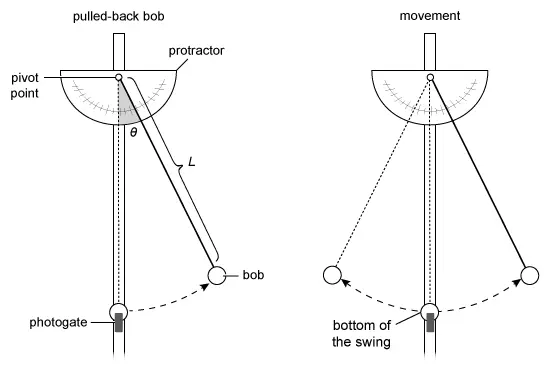How To Approach ACT® Science Questions With Examples
The ACT® science section can be daunting, especially for those who don't consider themselves strong in science. ACT.org notes that “the Science Test stresses science skills and practices over recall of scientific content, complex mathematics skills, and reading ability.” Though the concepts and topics tested in this section are introductory, the testing methods can be quite complex and confusing. Rather than just memorizing formulas or concepts, excelling on the ACT Science Test is more about developing a strategy for tackling the passages and questions, plus cultivating the critical thinking skills necessary to approach them.
The best way to prepare is to learn the types of ACT science passages that you’re likely to encounter by practicing questions modeled after the actual exam. In this guide, we will discuss different ACT Science strategies to help you manage your time effectively, and score well on the section.

ACT Science Passage and Question Types
There are three types of passages on the ACT Science Test:
These passages are associated with questions, which can be any of the following three types:
- Interpretation of Data Questions
- Scientific Investigation Questions, and
- Evaluation of Models, Inferences, and Experimental Results Questions
The first step to excelling in ACT Science is to create a dedicated study plan. We recommend 3 to 6 months of preparation to thoroughly review the exam's subject matter and enhance your critical thinking skills. Additionally, allocate separate sessions to familiarize yourself with the passage and question formats, and practice the skills needed to master them.
Research Summaries
Between 45% and 60% of the passages featured in the ACT Science Test typically comprise Research Summaries. At the start of the passage, you will find a short paragraph that contextualizes the motivation or purpose behind the experiment or experiments. They will provide you with details about the experiment and the variables that impact the research outcomes. Each research summary will be numbered for easy tracking.
The ACT Science questions associated with this passage type focus on the hypothesis, variables, testing methods, or other factors of the experiment’s design. You will also need to answer questions about conclusions or predictions that were made as a result of the experiment.
To effectively prepare for the Research Summary passage, it is crucial to familiarize yourself with interpreting graphs, tables, and charts.
Tricks and strategies to ace Research Summary passages
- Strategize Your Reading
When tackling ACT Science Research Summary passages, prioritize understanding the ‘big picture’ points before attempting the questions. If a scientific writing style isn’t your forte, don’t assume that the passage is outside your skill set – these passages rely more on your comprehension skills than scientific knowledge.
Thoroughly read and take notes, as the nuances in this section are critical. Even if you don’t fully understand every piece of information, reading everything allows you to locate information for a specific question.
We also recommend you underline key information. It helps you navigate passages that discuss multiple experiments and lets you focus on differences in methodology, purpose, and variables for a comprehensive approach.
- Evaluate the Variables
Pay attention to and underline the independent variables (the factors put in place by the researchers) and dependent variables (the factors that are impacted and examined). These can include parameters like temperature, pressure, distance, time, pH, etc. These are important data points that can come in handy when addressing specific questions.
- Understand the Purpose of the Experiment
You’ll benefit from understanding why the research was conducted in the first place. The purpose of the research will usually be stated in the first paragraph of the passage. Finding out what the researchers are studying and examining will give you a better context of the experiment, its methodologies, and possible outcomes.
Stick to the information in the passage when answering questions. If the experiment focuses on a topic that you have a background in, avoid using outside information to predict trends or draw conclusions.
- What is the method of research?
Another key piece of information to note is the research methodology being used. This should also be clearly stated in the introduction of the passage. A thorough understanding of the research methodology will help you approach the questions better, especially in those passages where two conflicting methodologies are presented.
Research Summaries examples
Two studies of 6 trials each were performed with several pendulums consisting of various lengths and bobs.
In each trial, the following occurred: First, a string having a length of L was attached to a bob of mass m b. Next, the end of the string opposite the bob was attached to a pivot point to create a pendulum. Then, using a protractor attached to the pivot point, the bob was pulled back to a selected displacement angle θ and the bob was released. Figure 1 illustrates the sequence of events, beginning with the string at a selected θ.
Figure 1
The values for kinetic energy (KE) and velocity (v) at the bottom of the swing (the lowest point of the bob during its movement) were determined using values recorded by a photogate placed below the pivot point. Values for the period T (the time of 1 full cycle of the pendulum from its starting position) were determined using a stopwatch.
In Trials 1–6, various combinations of L and m b were set while θ equaled 40°. Table 1 shows the values of KE (in joules, J) and v at the bottom of the swing for each trial and the value of T.
| Trial | L (m) | mb (kg) | KE (×10-5 J) | v (m/s) | T (s) |
|---|---|---|---|---|---|
| 1 | 0.10 | 0.10 | 2.29 | 0.68 | 0.63 |
| 2 | 0.20 | 0.10 | 4.59 | 0.96 | 0.90 |
| 3 | 0.30 | 0.10 | 6.88 | 1.17 | 1.10 |
| 4 | 0.10 | 0.20 | 4.59 | 0.68 | 0.63 |
| 5 | 0.10 | 0.30 | 6.88 | 0.68 | 0.63 |
| 6 | 0.10 | 0.40 | 9.17 | 0.68 | 0.63 |
In Trials 7–12, various combinations of L and θ were set while m b equaled 0.1 kg. See Table 2.
| Trial | L (m) | θ (degrees) | KE (×10-6 J) | v (m/s) | T (s) |
|---|---|---|---|---|---|
| 7 | 0.10 | 10 | 1.49 | 0.17 | 0.63 |
| 8 | 0.20 | 10 | 2.98 | 0.24 | 0.90 |
| 9 | 0.30 | 10 | 4.47 | 0.30 | 1.10 |
| 10 | 0.20 | 20 | 11.83 | 0.49 | 0.90 |
| 11 | 0.20 | 30 | 26.28 | 0.72 | 0.90 |
| 12 | 0.20 | 40 | 45.89 | 0.96 | 0.90 |
A variable that was purposely kept constant during a set of trials and was not measured is called a controlled variable. What were the 2 controlled variables in Trials 10–12?
-
L and T
-
m b and L
-
m b and θ
-
θ and T
Study 2: In Trials 7–12, various combinations of L and θ were set while m b equaled 0.1 kg .
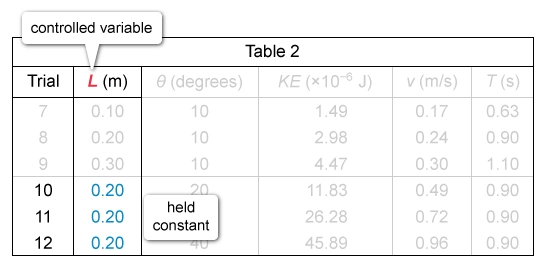
Analyze the passage and the results of Trials 10–12, shown in Table 2, to determine the controlled variables.
According to the passage:
- Trials 10–12 were in Study 2.
- In Study 2, mb equaled 0.1 kg and was kept constant through the trials.
Table 2 shows in Trials 10–12, L equaled 0.20 m and was kept constant through the trials.
Therefore, mb and L were the controlled variables in Trials 10–12.
(Choice A) Although the values for T did not change in Trials 10–12, this variable is considered a dependent variable because it was measured during the trials and was not controlled.
(Choices C and D) Various values of θ were tested in Trials 10–12, so this variable was not a controlled variable.
Things to remember:
Some questions require an analysis of both the passage and accompanying data tables.
Researchers discovered that some pitcher plants have adapted to a mutualistic relationship (when members of different species benefit each other) with 2 members of the class Mammalia. In a study of pitcher plants (Nepenthes rajah), researchers compared the scat (animal feces) from tree shrews (Tupaia montana) and summit rats (Rattus baluensis) inside and outside the pitcher plant. Figure 1 shows 2 locations of scat in relation to a pitcher plant (inside and outside). Figure 1 also shows, for each of the animals and locations, daily deposit rates of scat.
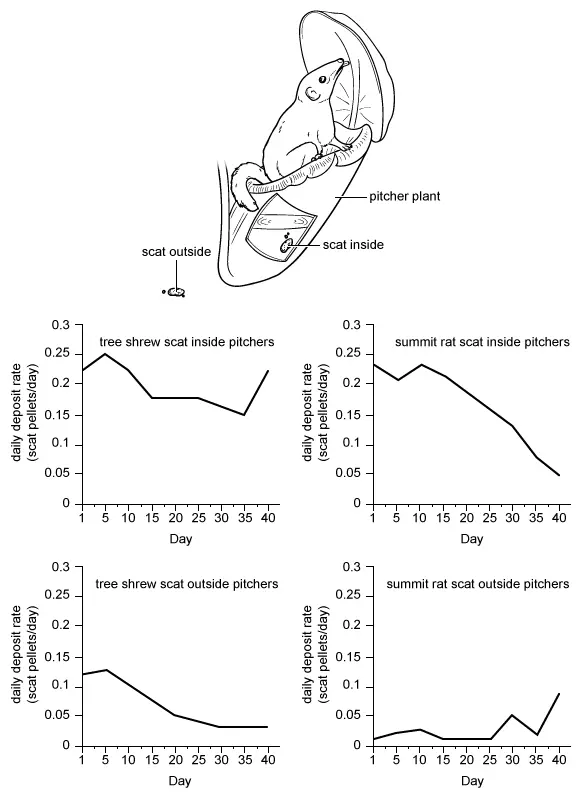
Figure 2 shows tree shrew and summit rat visitation rates to pitcher plants per time of day over a complete day.
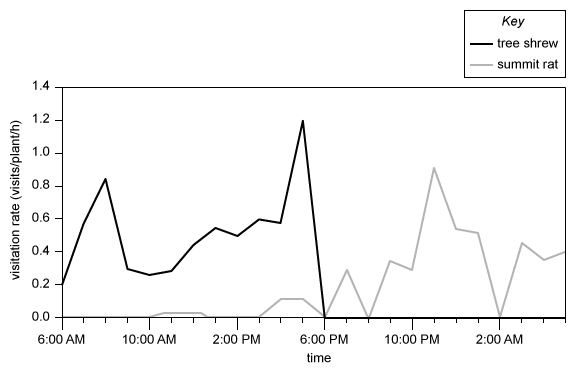
Which of the following variables was kept constant in this study?
-
Scat type
-
Daily visitation rate of summit rats
-
Species of pitcher plant
-
Daily visitation rate of tree shrews
Read the passage to determine which variable remained constant.
According to the passage, a study was performed on a single species of pitcher plant, Nepenthes rajah.
Therefore, the species of pitcher plant was the variable that was kept constant during the study.
(Choice A) According to the passage and Figure 1, there were two scat types used in the study.
(Choices B and D) According to Figure 2, the visitation rate for both tree shrew and summit rat changed according to the time of day.
Things to remember:
To identify a constant in an experiment, carefully read the
answer choices and passage and examine any graphs. Eliminate the variables that change and
identify the factors that remain unchanged throughout the experiment.
Data Representation
About 25-35% of passages (almost 3 out of 7) use data representation techniques to present information. As the name suggests, the Data Representation passages come accompanied by graphs, tables, or charts. They are designed to assess your skills in reading graphs, interpreting scatterplots, and interpreting information presented in tables. Each passage is associated with 5 or 6 questions. To answer these, you will need to interpret the data and make predictions about trends or patterns that are displayed in the visuals.
You can tell that a passage is a Data Interpretation passage if it is presented as a couple of paragraphs that are followed by a visual representation that refers to the information presented in the text. This structure should be recognizable. Note that Data Representation passages do not discuss specific experiments.
Strategies to ace Data Representation questions
If you are inexperienced with scientific writing or visual data representations, it can be overwhelming to know where to start. Here are some tips and strategies to help you tackle Data Representation passages on the ACT Science test:
- Note the Title, Axis Labels, and Units of Measurement
Focus on the big details first, and understand what the graph, table, or chart provides you in the title, axis labels, and units of measurement. This information is essential to note, especially if a question requires you to make a conversion in units of measurement.Looking at the titles and the axis labels can also help remove any guesswork from your process. If you are overwhelmed by having to decipher the main idea of the graph or table, try re-evaluating the labels to focus on the more significant details. If you fail to recognize the differences between the chart and the answer choices, you may be at risk of making a mistake.
- Read the Data CarefullyThe next step in your approach will require that you read the data presented by the visual. You will need to understand how the visual relates to the information presented in the text. This step will help you make connections between the visual information and the textual information presented, especially when drawing conclusions about the data.
- Find Patterns or Trends
Questions that follow ACT Data Representation passages may ask you to assess trends presented in a particular visual. Sometimes this requires you to make predictions or identify relationships between two data points. Paying attention to the type of visual presented is crucial here, because each graph comes with a set of characteristics that can help you select the correct answer choice. For example, a scatter plot presents the relationship between two data sets, while a ranking list shows data in an increasing or decreasing order.By analyzing the type of visual, you can understand better what the question asks and what the graph actually presents, so you can narrow down to the correct answer choice easily.
- Use the Process of EliminationIf you come to a question that asks about trends or patterns, look at the answer choices. The process of elimination is helpful, especially if you struggle to determine which pieces of information are important. Eliminate the ones that do not supplement the question asked, and pay close attention to the units used while eliminating answer choices.
Data Representation examples
Phthalates are chemicals that are added to plastics to make them soft and flexible. Because phthalates are not chemically bound to the plastics to which they are added, they can be released into the environment. Two experiments examined how the shape and concentration of iron oxide (Fe2O3) nanoparticles affect the degradation (chemical breakdown) of environmental dibutyl phthalate (DBP) upon exposure to light and hydrogen peroxide (H2O 2).
Experiment 1
Each of 15 identical beakers received 100 mL of a DBP solution with a concentration of 13 mg/L. The beakers were equally divided into 5 groups (Groups J–N). For each group of beakers, Fe 2O3 nanoparticles with 1 of 5 different shapes were added to achieve a nanoparticle concentration of 0.30 mg/mL (see Table 1).
| Group | Shape |
|---|---|
| J | flake |
| K | hollow |
| L | walnut |
| M | shuttle |
| N | burger |
Each beaker then received 50 microliters (µL) of H2O 2 and was placed on a magnetic stirrer located 20 cm from a 250 W light source. After 60 min, the concentration of DBP in each beaker was measured, and the average percent DBP degraded in each group was calculated (see Figure 1).
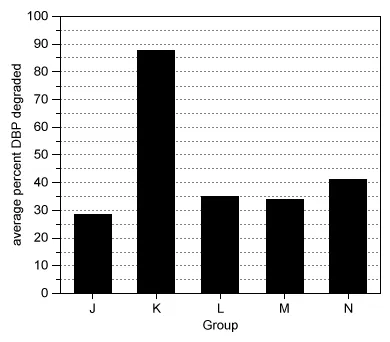
Experiment 2
Each of 15 identical beakers received 100 mL of a DBP solution with a concentration of 13 mg/L. The beakers were then equally divided into 5 groups (Groups O–S). Each beaker received 50 µL of H2O2 and was placed on a magnetic stirrer located 20 cm from a 250 W light source. For each group of beakers, hollow-shaped Fe2O3 nanoparticles were then added at 1 of 5 different nanoparticle concentrations (see Table 2).
| Group | Nanoparticle concentration (mg/mL) |
|---|---|
| O | 0.20 |
| P | 0.25 |
| Q | 0.30 |
| R | 0.35 |
| S | 0.40 |
After 60 min, the average percent DBP degraded in each group was determined as in Experiment 1 (see Figure 2).
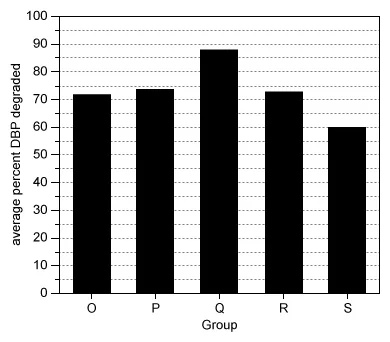
For any group, the value shown in Figure 1 was most likely calculated using which of the following expressions?
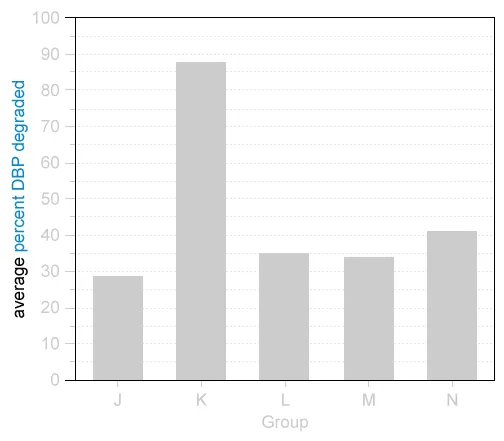
Examine Figure 1 and use prior knowledge to determine which mathematical expression was most likely used to calculate the values in Figure 1.
Figure 1 shows:
- The values represented in the graph are percentages.
- Each percent represents the portion of DBP that was degraded.
| Prior Knowledge: To calculate percent, divide the “part” by the “whole,” then multiply by 100. |
To calculate the percent, divide the degraded DBP (part) by the initial DBP concentration (whole). The amount degraded is the initial concentration minus the final concentration.
Therefore, the values shown in Figure 1 were most likely calculated using the following expression:
(Choice B) This expression may result from mistakenly switching the part and the whole. The concentration of the degraded DBP is part of the initial DBP.
(Choices C and D) Figure 1 includes data about the percent of degraded DBP concentration, not the percent of the nanoparticle concentration.
Things to remember:
Percentages are calculated by dividing the part by the whole
and multiplying the result by 100.
With a combination of historical and contemporary data sets, Lake Hazen, Canada’s largest and northernmost lake, can be used to study the ecological impact of temperature anomalies (TAs), unexpected changes in temperature. TAs for the northern hemisphere were calculated over the past 135 years. A sediment core from the lakebed of Lake Hazen was analyzed for a stable isotope of carbon (δ13C), nitrogen (N), and organochlorine pesticides (OCP). The parts per thousand of δ13C, the percent by mass of N, and the concentration of OCP indicate the degree of diagenesis, sediment delivery, and human activity contamination, respectively (3 measures of ecological impact), over the past 135 years. The results are shown in the figure.
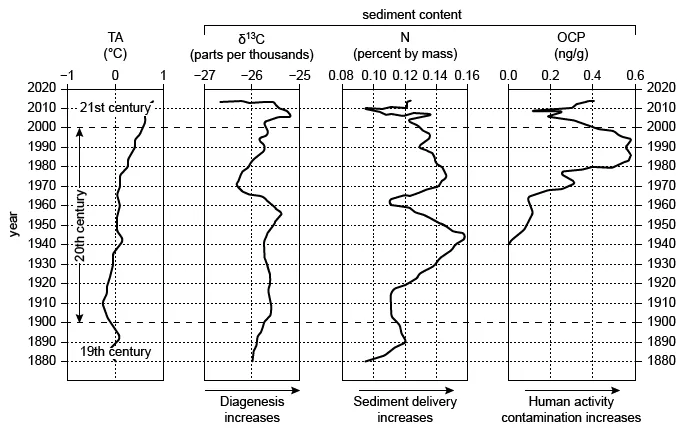
Over which of the following periods did the stable isotope of carbon both increase and decrease?
-
1880–1900
-
1930–1940
-
1960–1970
-
2000–2010
A sediment core from the lakebed of Lake Hazen was analyzed for a stable isotope of carbon (δ13C)….
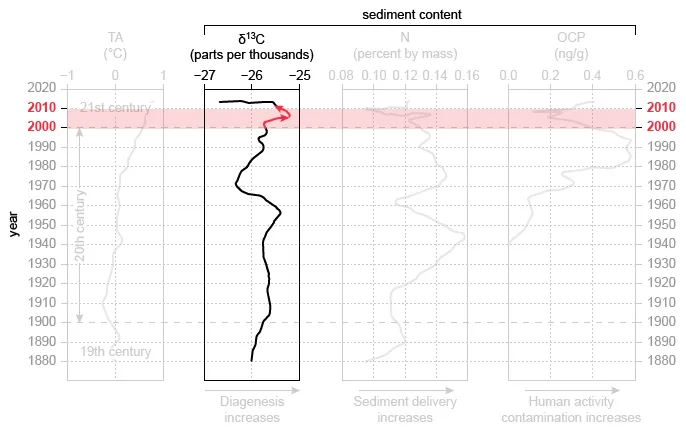
Analyze the passage and the figure to determine which of the periods listed in the answer choices had both an increase and decrease in the stable isotope of carbon.
According to the passage, the stable isotope of carbon is denoted by δ13C.
The figure shows that during the period 2000–2010, δ13C both increased and decreased.
(Choice A) In the period 1880–1900, the stable isotope of carbon increased only, instead of increased and decreased.
(Choice B) From 1930–1940, the stable isotope of carbon decreased and remained constant, instead of increased and decreased.
(Choice C) In the period 1960–1970, the stable isotope of carbon decreased only.
Things to remember:
Identify the axis labels to determine what is shown in the figure before identifying trends.
Practice with difficult questions so the real exam feels easy.
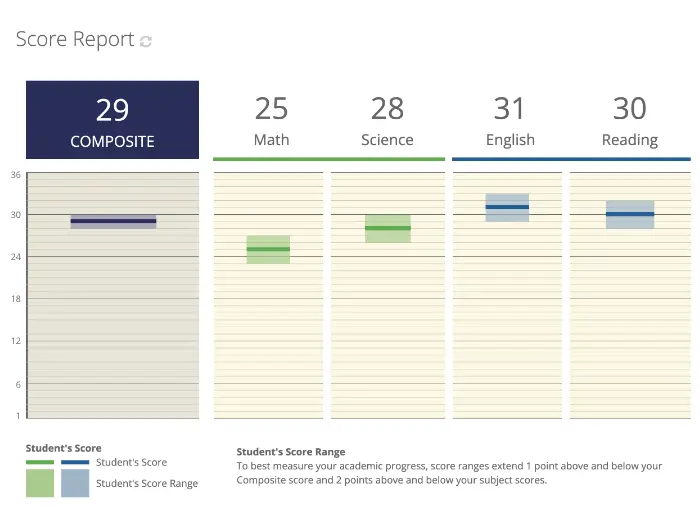
Conflicting Viewpoints
A conflicting viewpoint passage presents an issue or an introduction, followed by two or more conflicting arguments or perspectives on the given issue. It may come with visuals, as well. There will be 1 Conflicting Viewpoint passage on the ACT Science Test, and it is presented with 7 associated questions.
You can expect the conflicting viewpoint passage in this format: an introduction stating the issue, usually followed by two hypotheses/perspectives on the issue. The ACT Science questions associated with this passage will generally require you to understand the different perspectives, and compare them.
Tactics for excelling at the Conflicting Viewpoint passage
The rule of thumb for Conflicting Viewpoints passage is to keep it for the last, as it requires the most amount of time. Also, invest time into reading the whole passage before jumping to the questions. Below are 5 important ACT Science strategies that can make answering questions from the Conflicting Viewpoint passage easier:
- Pay Attention to the IntroductionThe introduction provides the context for the perspectives or points-of-views that are presented in the passage. Skipping or skimming through the introduction can lead to incorrect inferences when answering the questions. Be sure to carefully read this portion of the passage to ensure you fully comprehend the difference between each perspective.
- Make Notes or Bullet Points for the PerspectivesTo save a ton of time jot down lists of the distinguishing characteristics of the viewpoints presented in the passage. Underline the key points for each viewpoint, then use bullet points or mini-summaries to capture your notes. That way you’ll have a resource ready to refer to when answering questions.
- Avoid Validating a ViewpointIn some cases, you may think that a certain perspective is inaccurate based on your science knowledge. Keep in mind that the goal of this passage is not to test your knowledge of science. The goal is to demonstrate that you comprehend the viewpoints asserted in the passage. As you respond to related questions, ensure that you accurately reflect the perspective from the passage even if you think that perspective is invalid.
- Eliminate Wrong Answer Choices SystematicallyWhen answering questions, identify answer choices addressing the wrong viewpoint, and eliminate them. This will help you focus on those answer choices that align with the viewpoint stated in the question.
- Practice Timed ReadingPractice reading scientific passages within time constraints to develop your comprehension and analytical skills. While you read, identify patterns, trends, or conflicting arguments. Regular timed practice will enhance your time management and response speed during the actual test.
Conflicting Viewpoints examples
Organic molecules contain carbon atoms and are critical to life. Their presence on Mars can be explained by either biotic or abiotic processes.
Biotic processes are associated with the chemical reactions carried out by living organisms. These reactions allow the organisms to obtain energy, grow, and reproduce. Such reactions result in the production of organic molecules like proteins.
Abiotic processes are not associated with the activities of living things. Interactions between nonliving factors in the environment can result in the production of certain organic molecules. Methane (CH 4) is an organic molecule that can be produced by chemical reactions that occur between certain minerals and water under appropriate temperature and pressure conditions. Two abiotic processes that can produce organic molecules are shown in Figure 1.
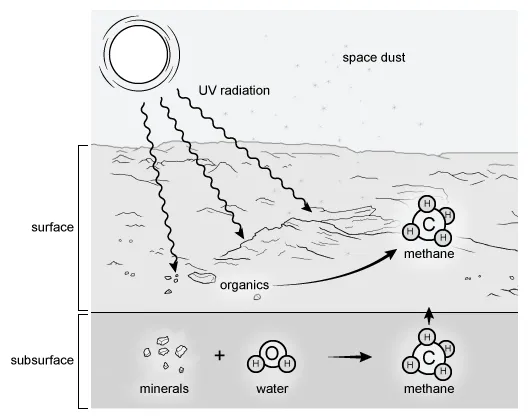
Figure 1
Two scientists present their viewpoints about the abiotic origin of organic molecules on Mars.
Scientist A
The Curiosity rover from NASA’s Mars Science Laboratory mission has detected various organic molecules on Mars, including methane and chlorobenzene. Tests conducted by the rover have shown that the concentration of methane in the atmosphere of Mars varies with location and time. The rover has detected spikes in methane concentration in which the concentration showed a tenfold increase for brief periods of time and then decreased again. A sharp spike in methane concentration is consistent with methane being produced in a specific localized area. Geologic processes on Mars could produce the conditions necessary for reactions to occur between minerals and water, resulting in localized spikes in methane concentration. The flow of the liquid water required for these reactions is demonstrated by the dark streaks observed on the surface of Mars.
Scientist B
Liquid water does not exist on Mars, and the geologic conditions necessary to produce methane from reactions between minerals and water are not present there. The dark streaks observed on the surface of Mars are due to wind-blown sand and dust slipping down steep slopes. The organic molecules that exist on Mars were delivered to the surface of Mars in comets, meteorites, and dust from space. Ultraviolet (UV) radiation interacts with these organic molecules on the planet’s surface, resulting in the production of methane that moves up into the atmosphere. Localized spikes in methane concentration are due to increased delivery of organic molecules to Mars during meteor showers.
Which of the following topics is discussed by Scientist B but not by Scientist A?
-
The occurrence of methane concentration spikes on Mars
-
The production of methane from exposure of organic molecules to UV radiation
-
The flow of liquid water on Mars
-
The addition of organic molecules to the surface of Mars by microorganisms
Scientist B: Liquid water does not exist on Mars…. Ultraviolet (UV) radiation interacts with these organic molecules…resulting in the production of methane….
Analyze the viewpoints of Scientists A and B to identify which topic was discussed only by Scientist B.
According to the passage:
-
Scientist B states that UV radiation interacts with organic molecules and results in the production of methane on Mars.
-
Scientist A does not mention methane production due to UV radiation.
Therefore, the production of methane from exposure of organic molecules to UV radiation is discussed by Scientist B but not by Scientist A.
(Choice A) Both scientists discussed the occurrence of methane concentration spikes on Mars.
(Choice C) Scientist A believes that liquid water flows on Mars, and Scientist B believes that liquid water does not exist on Mars. Therefore, both scientists discussed the topic of whether liquid water flows on Mars.
(Choice D) Neither Scientist A nor Scientist B discussed microorganisms.
Things to remember:
To identify an event discussed by one individual and not by
another, analyze the descriptions for specific terms associated with the events in each discussion.
The concentration of carbon dioxide (CO2) in the atmosphere affects Earth’s organisms in multiple ways. Two scientists discuss the effects of increased atmospheric CO 2 concentration on plant growth and on the diversity of plant communities.
Plants take CO2 from the atmosphere into their leaves through microscopic pores called stomata. The CO2 is required by the plant to carry out photosynthesis. Increased concentration of CO2 in the atmosphere allows plants to perform photosynthesis at a faster rate. This causes faster production of carbohydrates and faster plant growth. All types of plants require CO2, and thus all types of plants grow faster as a result of increased atmospheric CO2 concentration.
Plants lose water while taking in CO2 from the atmosphere through open stomata. When atmospheric CO2 levels are elevated, plants open their stomata less. This results in less loss of water by the plants and less uptake of water from the soil. Decreased uptake of water from the soil results in greater soil moisture. This increased soil moisture allows the survival of new types of plants that depend on greater water availability. Therefore, the diversity of plant communities increases due to increased atmospheric CO 2 concentration.
All plants require CO2 for photosynthesis, but some plants called C 4 plants use an alternative photosynthetic pathway by which they increase the concentration of CO2 in the specific cells that perform the Calvin cycle of photosynthesis. Because the concentration of CO2 in the photosynthetic cells of these plants is already high, C4 plants maintain the same rate of photosynthesis and maintain the same rate of growth as atmospheric CO2 concentration increases.
Plants take in CO2 from the atmosphere through open stomata, but they obtain required nitrogen-containing compounds through their roots. Some plants called legumes have nodules on their roots that contain symbiotic bacteria that convert molecular nitrogen from the atmosphere into the types of nitrogen compounds that are usable by plants. The symbiotic bacteria obtain carbohydrates from the plants. Legumes grow faster when atmospheric CO2 concentration is increased because they supply more carbohydrates to the symbiotic bacteria and receive more usable nitrogen compounds in return. Therefore, the diversity of plant communities decreases due to increased atmospheric CO2 concentration because legumes grow faster and outcompete other types of plants for sunlight.
Which of the following generalizations about plant communities is most consistent with Scientist 1‘s discussion?
-
Plant communities are less diverse in habitats with increased soil moisture.
-
Plant communities are less diverse with increased atmospheric CO2 concentration.
-
Plant communities are more diverse in habitats with increased soil moisture.
-
The structure of plant communities tends to remain unchanged over time.
Analyze Scientist 1’s discussion to determine which generalization is most consistent with that discussion.
Scientist 1 states that increased soil moisture allows the survival of new types of plants, and that the diversity of the plant community increases as a result.
Therefore, the generalization about plant communities that is most consistent with Scientist 1’s discussion is that plant communities are more diverse in habitats with increased soil moisture.
(Choice A) Scientist 1 explains that the diversity of plant communities increases as a result of increased soil moisture. Therefore, Scientist 1 believes that plant communities are more diverse, not less diverse, in habitats with increased soil moisture.
(Choice B) According to the passage, Scientist 1 states that plant communities are more diverse, not less diverse, with increased atmospheric CO2 concentration.
(Choice D) Scientist 1 states that the diversity of plant communities increases with increased atmospheric CO2 concentration. Therefore, if the diversity of the plant communities increases, it does not remain unchanged over time.
Things to remember:
To identify a generalization that is consistent with an
individual’s discussion, look for points of agreement between the discussion and the generalization.
Key Takeaways
In conclusion, the 5 efficient ACT science strategies that’ll help you master this section are:
- Knowing how to approach different passages and question types.
- Improving your time management techniques.
- Learning how to read and interpret data.
- Using the process of elimination to arrive at the correct answer.
- Employing smart guessing techniques for challenging questions.
Start practicing with our thousands of high-quality ACT questions and in-depth explanations.
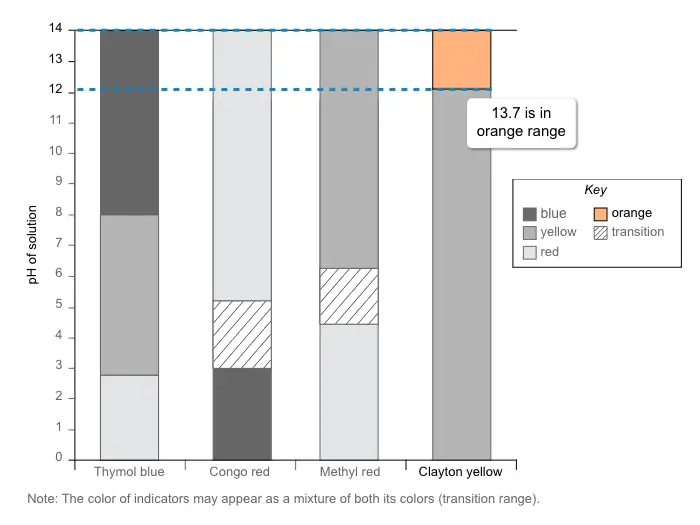
References
- Description of Science Test. (n.d.). ACT.
https://www.act.org/content/act/en/products-and-services/the-act/test-preparation/description-of-science-test.html -
The ACT Science Practice Test Questions. (n.d.). ACT.
https://www.act.org/content/act/en/products-and-services/the-act/test-preparation/science-practice-test-questions.html?page=0&chapter=0
